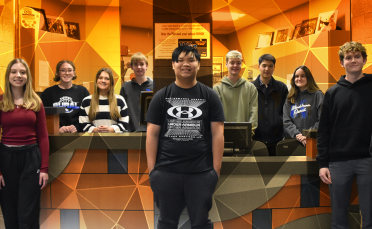Career Exploration: How to Encourage Kids of All Ages

“What do you want to be when you grow up?”
When it comes to inspiring kids to think about their futures, asking this question can really put them on the spot. Sure, adults often think kids’ answers are cute, but for some kids, this question can be quite stressful because they don’t have any clue yet what their options are, and they might feel like they have to have their life mapped out in third grade!
Instead of expecting an eight-year-old or even an eighth grader to have a solid plan for their future, here are some suggested ways parents, teachers and other adults can work career exploration into everyday life at different age levels, reducing stress and making the road to self-discovery fun.
Exploring Careers in Elementary School: Discovery
Starting early doesn’t mean having your child choose a specific career path. On the contrary, it’s about helping your kid be on the lookout for possibilities. The elementary years are full of self-discovery and career exploration is one way kids can learn about themselves and the world around them.
Researchers and educational theorists have indicated that by the end of elementary school, students have already ruled out certain careers based on factors like gender and social status. To help prevent this pigeonholing, discuss jobs in a way that makes them more accessible to your child. Focus on people of different genders and ethnicities filling all kinds of roles. Talk about the interests and skills required in various career fields. Then kids can start to see the importance of their own interests and skills and how they might come into play in the future. This simple shift will broaden possibilities rather than narrow them.
How can you support kids at this stage? Instead of asking a child what they want to be when they grow up, ask what kinds of problems they like to solve and what activities they enjoy. Talk about which jobs involve similar challenges and activities. Ask if that field interests them and if they think they would be good at that job. If you encounter workers in that field, encourage your child to ask them about what they do. The possibilities will grow from there.
Exploring Careers in Middle School: Awareness
Studies have shown that middle school is a prime time to focus on career exploration. Often students start to think more concretely about their futures in sixth grade, but they’re not yet able to connect the dots between understanding what career preparation is and planning for a specific career.
Middle school youth also have a limited understanding of the professional world because their knowledge is often shaped solely by what family members do for a living. This can constrain their own prospects, so middle school is a great time to introduce them to more career fields. Encourage your kids to look beyond the familiar. Doing so now will give them lots of opportunity to try on different careers. Knowing what they like can be just as valuable as knowing what they don’t like!
Children’s abstract thinking skills develop during this time and career exploration can help them link what they’re learning in school with how that applies to their futures outside of school. As they become more adept at solving problems, working together in teams and leading others, help them understand how those soft skills are just as important as academic knowledge. Explain how those skills will play a major role after school in their professional lives.
One study found middle school students who participated in a career education program showed improved self-esteem, improved test scores in STEM subjects, and increased engagement in academic planning.
How can you support kids at this stage? As you introduce different careers, talk about the soft skills used in those jobs. Ask your child if they can think of examples from school when they’ve had experience with problem solving, responsibility, communication, collaboration, leadership and behaving ethically. If they express an interest in a particular field, ask what skills and knowledge may come into play and how they might develop those. This can set them up for success in high school and beyond. Not sure where to start? Try a career quiz for some ideas.
Exploring Careers in High School: Planning
A recent poll showed about half of high school students were nervous about their plans after graduation. Career exploration can help turn that statistic around. A study found high school students who participated in robust career guidance programs had higher grades, were more satisfied with their education, felt safer in school, had better relationships with their teachers and felt better about their futures than students without access to such programs. If your teen’s school doesn’t offer such a program, find a local organization that does or discuss careers more with your child.
Without the benefit of career exploration, teenagers are more likely to make decisions about their futures that are based on a shaky foundation. Some common pitfalls include choosing a career field without really knowing what it entails, failing to take classes that would put them on a good path for a potential career and not understanding what would make a good fit for them professionally.
How can you support kids at this stage? When it comes to career preparation, nothing beats a personal experience or connection. Ask friends or associates if they’d be willing to talk with your teen about what they do for a living or host your child for a brief job shadow. You can also encourage your teen to pursue internships or apprenticeships for more hands-on experience.
Benefits of Exploration
As children grow, they risk becoming less engaged in school. Making school less about jumping through academic hoops and more about what life will look like after high school can help kids feel more invested in what’s being asked of them. Gallup polls indicate student engagement falls dramatically from elementary to high school. As engagement falls, so do academic outcomes and even career prospects.
One route to engagement is through career exploration because it makes a connection between your child’s interests and skills and how they can contribute to the world. The Kansas Career Sunflower is one initiative school districts are making to encourage exploration and engagement. It’s not about choosing a specific path early, but strategically learning about various careers and understanding how a career in each field could be a good match.
Our team at HirePaths likes to point out that parents are a child’s first career counselor. While some kids may know what they want to do after high school at a young age, others may take more time figuring it out. That’s perfectly okay! Your job is to encourage them to start the exploration process ahead of time, so when it’s time for them to narrow down their choices, they feel more confident in their decisions.
By making exploration fun and age-appropriate, you’ll help your kids learn about the world of work without making it feel like work!



